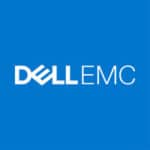Data storage solutions organize and backup enterprise data. Explore the top data storage software and vendors now.


Data storage solutions comprise a range of business-grade products for safely holding large volumes of data for archiving or to support critical applications and analytics. While the data storage landscape used to be relatively simple, the current market is full of myriad options from a diversity of storage types, including network attached storage (NAS) and storage area network (SAN) devices, flash arrays, and cloud products.
To help businesses choose, we compared different solutions on how well they met enterprise needs for pricing and features. Here are our top picks:
We also provide a buyer’s guide to help you make sense of the market and better choose the right type of storage solution to meet your needs.
Jump to:
Best SAN for enterprises
 In addition to features like thin provisioning and deduplication, Dell EMC’s PowerMax SAN is an NVMe storage solution—consider it for high-performing enterprise applications. It’s a particularly good choice for large data centers and can be deployed as a storage area network.
In addition to features like thin provisioning and deduplication, Dell EMC’s PowerMax SAN is an NVMe storage solution—consider it for high-performing enterprise applications. It’s a particularly good choice for large data centers and can be deployed as a storage area network.
PowerMax is often used for mission-critical traditional, container, and mainframe-based consolidated IT workloads. If you’re looking for a long-term investment for your business’s top databases and ecommerce sites, PowerMax is a strong option for businesses willing to foot the bill.
Dell offers multiple payment options for its storage products. Explore Dell’s options to find one that’ll best fit your budget and needs. Contact Dell or one of its technology partners for a detailed quote.
| Pros | Cons |
| NVMe-based storage to support high-speed applications | Raw capacity of the array is unclear |
| Good for data centers |
Best SAN for SMBs
 StarWind Virtual SAN is a hyperconverged solution designed to reduce hardware and complexity in SAN environments. Highly rated by customers, it’s one of the best SAN choices in the market for smaller organizations. StarWind even offers a free edition of VSAN, so if you’re a startup testing out your SAN options, this is a good place to start.
StarWind Virtual SAN is a hyperconverged solution designed to reduce hardware and complexity in SAN environments. Highly rated by customers, it’s one of the best SAN choices in the market for smaller organizations. StarWind even offers a free edition of VSAN, so if you’re a startup testing out your SAN options, this is a good place to start.
For the paid version of VSAN, you’ll need to request pricing from StarWind. You can also request a demo.
| Pros | Cons |
| Free option available | May not satisfy all large enterprise needs |
| Highly reviewed customer support | Some users found setup and management difficult, requiring significant technical expertise |
Best network-attached storage solution
 The Lockerstor 10 AS6510T from Asustor has 10 bays and supports hard disk drives (HDDs) as well as NVMe-based drives for businesses that want to add some extra speed to their NAS environment. The AS6510T offers plenty of cybersecurity features, including integrations with antivirus tools and two-step access verification. It’s suitable for both large and small businesses and is a fantastic choice for teams that want to focus on protecting their files.
The Lockerstor 10 AS6510T from Asustor has 10 bays and supports hard disk drives (HDDs) as well as NVMe-based drives for businesses that want to add some extra speed to their NAS environment. The AS6510T offers plenty of cybersecurity features, including integrations with antivirus tools and two-step access verification. It’s suitable for both large and small businesses and is a fantastic choice for teams that want to focus on protecting their files.
| Pros | Cons |
| Integrates with backup software | Asustor doesn’t offer much information about support |
| Offers four free camera channel licenses for teams that need a surveillance system |
Best public cloud storage
 Amazon Web Services (AWS) offers multiple cloud computing solutions, including Simple Storage Service (S3) for web-based object storage. S3 has multiple storage classes, depending on how frequently you need to access your data.
Amazon Web Services (AWS) offers multiple cloud computing solutions, including Simple Storage Service (S3) for web-based object storage. S3 has multiple storage classes, depending on how frequently you need to access your data.
If you’re interested in AWS’s database product, Relational Database Service (RDS) helps storage teams set up their databases with less manual work. Smaller storage teams will particularly benefit from a managed database service, particularly if they don’t have many developers or an extensive storage infrastructure.
AWS pricing covers a range of free and paid options.
| Pros | Cons |
| Web-based object storage allows users to manage their storage anywhere they have access to the internet | Public cloud storage offers less control over security, so determine whether AWS has the security measures your team needs for sensitive company data |
| Managed database service is helpful for smaller storage and dev teams |
Best flash array
 When most people think of flash storage, they think of expensive but blindingly fast storage to support only the most critical workloads. But FlashArray//C is unique—it’s designed for mid-sized workloads and high-capacity storage rather than the highest-speed transactions. Pure Storage is normalizing the use of flash for standard business workloads, not only rapid access use cases. The C90 array has a raw capacity of 2.3 petabytes. If your business needs a storage array for a variety of applications, consider FlashArray//C.
When most people think of flash storage, they think of expensive but blindingly fast storage to support only the most critical workloads. But FlashArray//C is unique—it’s designed for mid-sized workloads and high-capacity storage rather than the highest-speed transactions. Pure Storage is normalizing the use of flash for standard business workloads, not only rapid access use cases. The C90 array has a raw capacity of 2.3 petabytes. If your business needs a storage array for a variety of applications, consider FlashArray//C.
Contact Pure Storage for pricing information—the vendor requires potential customers to submit a quote request for any details.
| Pros | Cons |
| Supports NVMe drives | Not the best choice on the market for the most mission-critical enterprise applications |
| Technical account manager available for businesses that want one |
Best backup software
 Acronis Cyber Protect is an enterprise-grade backup and recovery solution that includes security features like URL filtering and vulnerability assessments. There’s a home office version, formerly known as Acronis True Image. Acronis Cyber Protect Cloud is also available for managed service providers, offering them advanced automation, disaster recovery, and data loss prevention features. Acronis is a strong choice for any sized business, from large MSPs to the remote entrepreneur’s living room office.
Acronis Cyber Protect is an enterprise-grade backup and recovery solution that includes security features like URL filtering and vulnerability assessments. There’s a home office version, formerly known as Acronis True Image. Acronis Cyber Protect Cloud is also available for managed service providers, offering them advanced automation, disaster recovery, and data loss prevention features. Acronis is a strong choice for any sized business, from large MSPs to the remote entrepreneur’s living room office.
The following prices are for one workstation; Acronis also provides pricing for servers, virtual hosts, Windows server essentials, and business office suites:
| Pros | Cons |
| Doubles as stand-in endpoint protection platform if your business doesn’t have one yet | Could be pricey for some SMBs, depending on the number of servers and workstations to protect |
| Managed service option for MSPs |
While storage solutions and software encompass a very broad range of data management products, there are a few common functions that most storage systems should have:
While purchasing a storage solution takes time and communication among your organization’s teams, it doesn’t have to be needlessly complicated.
Rarely does one type of data storage software or hardware fit all business use cases. The likelihood that you’ll need both a NAS and a SAN for different storage situations is high, for example. Some storage products support critical applications, while others store archive data that only needs to be accessed once a year. It’s cheaper in the long run to select the best-fitting solution for a particular use case.
Don’t rush to buy a product—you want to find something long-lasting and don’t want to hurry into a purchase you’ll regret. Also, spending some time reflecting on a vendor’s offerings and their marketing pitch is never a bad idea.
Don’t just assume that a vendor has everything you need—or offers quality customer support. Ask to speak with representatives from the company you’re considering purchasing from, and note their transparency. Ask questions about technical support availability.
Finding a product that fits your budget and your feature list can be difficult, but while it’s good to stay within budget, don’t pick a lackluster product that will only last your business a few years. High-quality storage products are a long-term investment.
Storage teams are not all equal in experience and skills. You want a product that can grow with your business and be customized, but you also want your team to be able to use it immediately. Look for products that balance ease of use with the level of customizability your storage personnel need based on their experience. This goes for storage products’ technical support as well: a highly experienced storage team probably won’t need to rely on a vendor’s support as much, but a junior team might.
To select the top storage solutions in the categories above, we used product analysis rubrics, user review data, and overall insights on the enterprise storage market. We selected the product that scored highest on our rubric from the following buyers’ guides:
We also selected some of the best-known, most popular, and highest-rated products in the following buyers’ guides:
We also selected StarWind for the best SMB SAN—it doubles as SAN and HCI solution. StarWind’s hyperconverged appliance appears on our list of best hyperconverged infrastructure vendors, and StarWind has high user reviews overall.
Enterprise Storage Forum uses a combination of feature and product analysis and market and user experience to select and review storage solutions. In our rubric-informed buyers guides, we grade products by the number of criteria they meet and features they offer.
If you still have questions about storage products, we cover some points that may come to mind when researching solutions for your business.
Top enterprise needs, vendor compatibility, and price are three of the top points to consider when looking for a storage product. It’s never a bad idea to find a whiteboard and shortlist your business’s three to five ideal features before you try to find the product that offers them. And while price isn’t the most important consideration, work to stay in budget. Often, enterprise-class solutions take plenty of time and effort to deploy, so ensure you’re prepared for such a product.
Being able to store copies of data in multiple locations helps businesses protect their data from loss. The cloud plays a key role in this—if your data is stored in multiple AWS regions, you won’t lose it all if one region has a major outage. Many storage solutions also integrate with popular backup providers. We recommend choosing storage products that offer either backup integrations or features that are already built into the storage hardware or software.
The short answer: not really. The longer answer is that certain products are better suited to certain use cases within certain industries. For example, archival solutions (like cold storage tiers in AWS or Microsoft Azure) store data that isn’t accessed frequently. Businesses in the financial and healthcare industries are often required to store data for years, so archive storage is one of the cheapest ways to do that. On the other hand, businesses in those same industries also need to process data rapidly, so they’ll need flash arrays, too.
There will always be a few products best for a certain industry, like a NAS unit ideal for multimedia teams because of its specific features. But generally speaking, organizations in most industries need multiple storage products for different data use cases.
Data storage software and solutions help storage teams manage large volumes of data and protect it. It’s no longer an option for businesses to just throw their money at the nearest cloud storage provider and hope it sticks—most organizations have very specific needs. The key is getting to know your own business’s needs and how specific vendors could meet them. If you want a storage vendor to be a true partner, you’ll need to do research.
Lastly, don’t get discouraged—finding a good storage solution takes time and research, but the result will serve your organization and its data for years to come.
Read our recommendations for choosing storage management software next.


Jenna Phipps is a staff writer for Enterprise Storage Forum and eSecurity Planet, where she covers data storage, cybersecurity and the top software and hardware solutions in the storage industry. She’s also written about containerization and data management. Previously, she wrote for Webopedia. Jenna has a bachelor's degree in writing and lives in middle Tennessee.

Enterprise Storage Forum offers practical information on data storage and protection from several different perspectives: hardware, software, on-premises services and cloud services. It also includes storage security and deep looks into various storage technologies, including object storage and modern parallel file systems. ESF is an ideal website for enterprise storage admins, CTOs and storage architects to reference in order to stay informed about the latest products, services and trends in the storage industry.
Property of TechnologyAdvice. © 2026 TechnologyAdvice. All Rights Reserved
Advertiser Disclosure: Some of the products that appear on this site are from companies from which TechnologyAdvice receives compensation. This compensation may impact how and where products appear on this site including, for example, the order in which they appear. TechnologyAdvice does not include all companies or all types of products available in the marketplace.